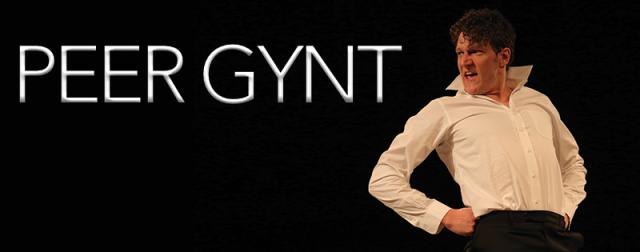
Henrik Ibsen wrote Peer Gynt before he wrote the realistic dramas he’s so famous for (Hedda Gabler, A Doll’s House). It’s a verse drama, published in 1867, based on a Norwegian folk myth. Its 40 scenes are sometimes realistic, sometimes surreal, and its many characters populate the stage for five hours or so. It’s enormously whimsical and theatrical, and it was originally paired with Edvard Grieg’s incidental music (which included “In the Hall of the Mountain King”). We first meet Peer as an impetuous young braggart who runs off with a bride not his own before her wedding. He has a long series of adventures and misadventures, including seducing the troll king’s daughter, becoming a slave merchant, and incidents at sea. Finally he assesses his life just before his death – and Ibsen dwells on discussion. At The Classic Stage Company, John Doyle has adapted the script into a drastically abridged form, running just two hours without intermission. Ibsen’s verse has been translated into prose. Mr. Doyle’s directs the play on a bare stage, merely a raised platform in the center of the audience, without a single piece of set. He works with a cast of seven in contemporary costume. This is extreme minimalism suggesting Peter Brook. Even the realistic scenes fade in and out as if in a dream. Grieg’s symphonic score has been replaced by occasional fiddling by a couple of cast members, and Peer’s mother speaks with a Southern twang. With its epic reach and its shifting settings, the play is difficult to follow. But it’s particularly difficult in this pared-down production without benefit of scenery. Mr. Doyle’s direction is precise, meticulous. Every moment has dramatic tension and a theatrical sense very different from Ibsen’s intent. Mr. Doyle’s vision is intense and vivid. When we meet Peer as a successful businessman, he tosses paper money in the air and it flutters down like oversized ten-dollar-a-pop confetti. Gabriel Ebert is commanding as Peer, acting with unwavering focus and a strong technique. There’s a marvelous passage when he has a conversation with his own self, whose lines are spoken in a whisper. And he has a great moment peeling an onion, weeping because he finds no core (as there is, by extension, no core to Peer’s personality). But this Peer never really ages; Mr. Ebert indicates the character near his death merely with rolled shoulders. We miss the luscious satisfaction of traveling a lifetime with him. The rest of the cast, playing the other characters as needed, gives him solid support. Jane Pfitsch is particularly strong as the Bride. The production is ultimately so demanding that it’s more suited to an Ibsen specialist than a general audience, but we can’t deny the genius that created it. It may not be Ibsen’s classic script, but it’s a monumental adaptation.
